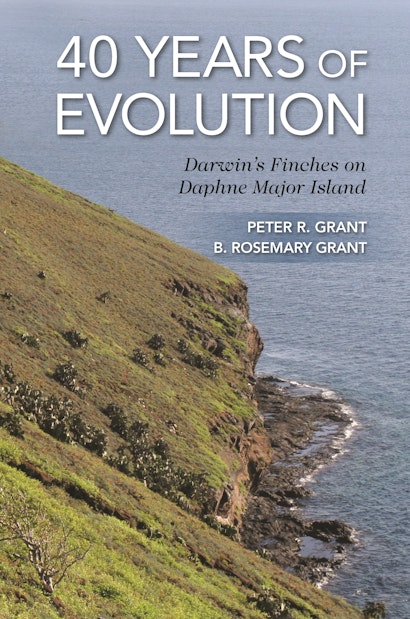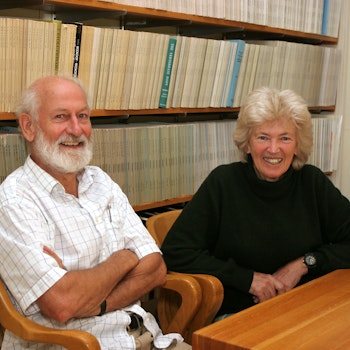Renowned evolutionary biologists Peter and Rosemary Grant have produced landmark studies of the Galápagos finches first made famous by Charles Darwin. In How and Why Species Multiply, they offered a complete evolutionary history of Darwin’s finches since their origin almost three million years ago. Now, in their richly illustrated new book, 40 Years of Evolution, the authors turn their attention to events taking place on a contemporary scale. By continuously tracking finch populations over a period of four decades, they uncover the causes and consequences of significant events leading to evolutionary changes in species.
The authors used a vast and unparalleled range of ecological, behavioral, and genetic data—including song recordings, DNA analyses, and feeding and breeding behavior—to measure changes in finch populations on the small island of Daphne Major in the Galápagos archipelago. They find that natural selection happens repeatedly, that finches hybridize and exchange genes rarely, and that they compete for scarce food in times of drought, with the remarkable result that the finch populations today differ significantly in average beak size and shape from those of forty years ago. The authors’ most spectacular discovery is the initiation and establishment of a new lineage that now behaves as a new species, differing from others in size, song, and other characteristics. The authors emphasize the immeasurable value of continuous long-term studies of natural populations and of critical opportunities for detecting and understanding rare but significant events.
By following the fates of finches for several generations, 40 Years of Evolution offers unparalleled insights into ecological and evolutionary changes in natural environments.
Awards and Recognition
- Honorable Mention for the 2015 PROSE Award in Biological Sciences, Association of American Publishers
- One of Choice's Outstanding Academic Titles for 2014
"For the Grants, Daphne Major has been a magic well. With their four decades of work on the island, they've made it a magnificent microcosm, a model of life on Earth."—Jonathan Weiner, New York Times
"For the Grants, evolution isn't a theoretical abstraction. It's gritty and real and immediate and stunningly fast. . . . Most of all, the book is an affirmation of the importance of long-term fieldwork as a way of capturing the true dynamism of evolution."—Joel Achenbach, Princeton Alumni Weekly
"The study described here is truly exceptional. Peter and Rosemary Grant . . . have devoted their careers to the study of the group of birds known as Darwin's finches on the Galapagos archipelago, one of the most isolated and inhospitable places on Earth. But the payoff is that their research furnishes some of the most compelling evidence for natural selection and the origin of species. . . . The Grants' achievement is monumental."—Tim Birkhead, Times Higher Education
"[O]ne of the most intriguing books I have ever read. . . . Read it for yourself. You'll be glad you did!"—Allan Archer, BTO News
"This volume not only provides detailed evidence of the evolution of a specific group of animals, but also offers an overall perspective on how and in what ways bird species have changed in this rather isolated locality."—Choice
"Beauty is in the eyes of the beholder and ‘best' is often a subjective term. In the case of the Grant's work on Galapagos finches, I think it is possible to argue objectively that it really is the best by some measures because of its design, sustained execution, and continual incorporation of new methods and ideas. This book contributes to the status of their research program because it makes this body of work readily accessible to a much larger audience."—David Reznick, Ecology
"40 Years of Evolution offers readers numerous opportunities for inspiration at how the study of ecology, evolution, and natural history of finches on a small island reflects the forces at work in the Galapagos and throughout life."—Frederick R. Davis, Quarterly Review of Biology
"This book uses hard won data . . . to draw insightful conclusions about the messy, dynamic, and creative processes of evolutionary change and lineage divergence. It would make an excellent . . . textbook for a college-level course in evolution because it has it all: natural selection, sexual selection, heritability, competition, character displacement, speciation, and extinction. . . . This book is a tribute to the authors themselves."—Michael S. Webster, Evolution
"Reading this book is like having an engaging conversation with two of the most prominent and charming field biologists of our time. Come listen to their singular adventure, unprecedented insight, and eyewitness account of evolution in action. A terrific must-read for all students of biology, from enthusiasts to experts."—Hopi E. Hoekstra, Harvard University
"This masterful work summarizes four decades of research on Darwin's finches by the Grants and their many students and collaborators. The book provides an eloquent illustration of how our general understanding of evolution is advanced by a rigorous, sustained focus on a handful of species on a single island."—Joel G. Kingsolver, University of North Carolina, Chapel Hill
"A captivating synthesis of arguably the most important research program in evolutionary biology in the last half century. From classic work on Darwin's finches decades ago to groundbreaking new discoveries, it's all here. A must-read for any student of evolution."—Jonathan Losos, Harvard University
"In this delightful and informative book, Peter and Rosemary Grant bring readers along on their four-decade voyage of discovery into the lives of Darwin's finches in the Galápagos archipelago. This is a book about evolutionary change and the origin of new species. The Grants' story—about themselves, natural history and scientific inquiry, and birds and speciation—will inspire anyone with an interest in the natural world."—Robert E. Ricklefs, University of Missouri, St. Louis
"This magnificent book is about the most successful field study on evolution ever conducted—the Darwin finch project on the island of Daphne Major. There is no other book or team of researchers that tells similar stories with such fine detail and such a clear eye over an equivalent span of time. Defying comparison, 40 Years of Evolution is one for the ages."—Dolph Schluter, University of British Columbia



